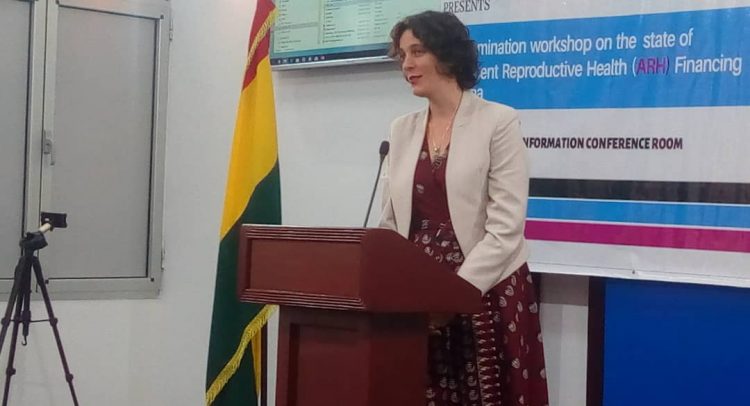Anne Coolen speaking at the workshop
STAKEHOLDERS HAVE lamented low funding or budgetary allocation from the Government of Ghana towards adolescent reproductive health across the country.
It comes as Ghana joined the rest of the world on Tuesday, May 28, 2019 to commemorate this year’s menstrual hygiene day.
The research aimed to explore opportunities for increased government funding for adolescent adolescent reproductive health and programming towards, reaping the demographic dividend for national development in Ghana.
The dissemination workshop was a sequel to the implementation of the action plan developed by NPC and MSIG based on recommendations from the evaluation of the ARH Summit.
Ghana Country Director of Marie Stopes International Ghana (MSIG), Anne Coolen, speaking at a workshop in Accra on Tuesday to disseminate a research report on the ‘State of Adolescent Reproductive Health Financing in Ghana,’ lamented that there has not been much budgetary allocation for adolescent reproductive health in the country.
Prof. Kumi Kyeremeh from the University of Cape Coast who presented the report, said from 2000 to 2013, there was an increase in Government’s spending in the health sector.
In 2013 for instance, he revealed that the Ghanaian Government spent about $55 on the health of each Ghanaian.
However, after 2013, he said, there has been a reduction in Government’s spending in the health sector.
‘Ridiculously Low Funding’
According to him, for some of the years, Government has spent between $3 to $5 , lamenting that “and this is ridiculously low.”
He reported that “so we are not spending on health generally and it is a challenge. Spending on reproductive health is not adequate.”
Consequences
Executive Director of the National Population Council (NPC), Dr. Leticia Adelaide Appian, the dissemination workshop offered the Council and its partners the opportunity to provide outcomes reference to key recommendations made during the 2nd National Adolescent Reproductive Health (ARH) Summit held in Accra from 29th to 30th August, 2018.
Touching on the consequences of the low funding, she lamented “unintended pregnancies in the general population and specifically among adolescents whose unmet need for family planning is above 50%.”
She indicated that “unintended pregnancies can be mistimed or unwanted and can have the following outcomes: Maternal ( late recognition of pregnancy hence late ANC )
Induced abortion, miscarriage, ectopic pregnancy and live birth ( low birth weight, small for gestational age, preterm baby).”
Data from USA, she explained, showed that a publicly funded birth in 2010 cost an average of $12,770 in prenatal care, labor and delivery, postpartum care and 12 months of infant care.
In 2010, she stressed, the US Government’s expenditure according to (Adam Sonfield and Kathryn kost , 2015) on the births, abortions and miscarriages resulting from unintended pregnancies totaled $21.0 billion.
“How much did Ghana spend on unintended pregnancies in 2010?”
“How much is the NHIA paying for this service in Ghana? How much will it cost to provide RH services to prevent an unintended pregnancy?” she quizzed.
For the infants the outcomes could be still births, infants surviving with complications from term and preterm deliveries include admissions to neonatal care, hospitalization and cerebral palsy, according to her.
“What are the costs to the families, health facilities and the taxpayers?, she quizzed.
Call For Increased Investment
Madam Coolen encouraged the Ghanaian government to increase its investment in health, especially adolescent health.
That, she said, was because, investment in health pays off more than any other investment a nation can make in other sector.
BY Melvin Tarlue

